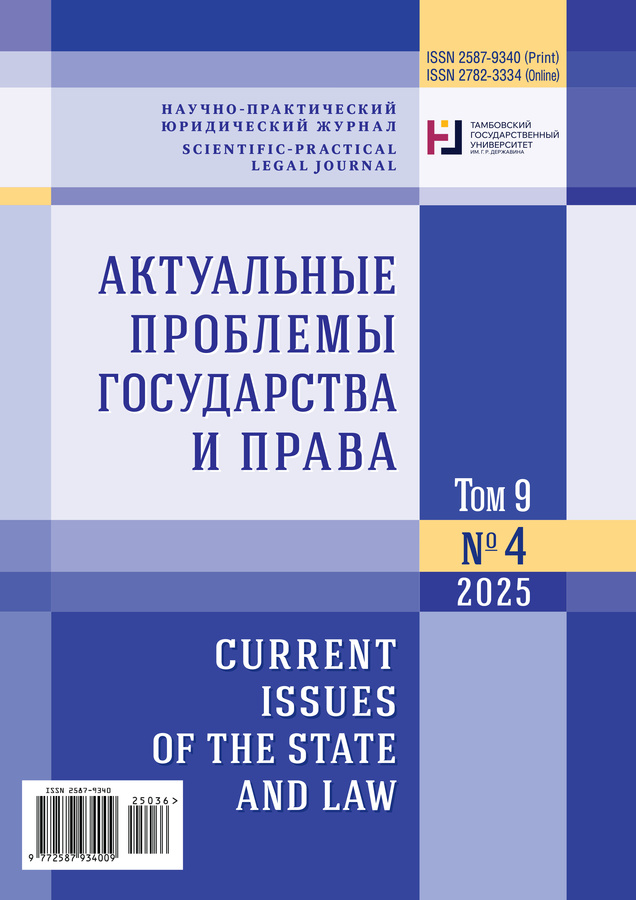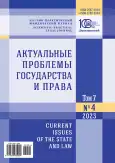О некоторых технико-юридических проблемах российского Уголовного кодекса
- Авторы: РЫЖКОВА И.Д.1
-
Учреждения:
- Липецкий филиал ФГБОУ ВО «Российской академии народного хозяйства и государственной службы при Президенте Российской Федерации»
- Выпуск: Том 7, № 4 (2023)
- Страницы: 536-543
- Раздел: Общая теория и история права и государства
- URL: https://journal-vniispk.ru/2587-9340/article/view/303695
- ID: 303695
Цитировать
Аннотация
С момента принятия в 1996 г. нового Уголовного кодекса Российской Федерации в литературе не прекращается дискуссия о его структуре, разделах, главах и отдельных статьях. Российской научной школой сделан серьезный вклад в развитие юридической техники в уголовном праве. Многие замечания, явившиеся результатом анализа правовых норм, были учтены законодателем, но продолжающееся видоизменение уголовного закона нашей страны не вызывает оптимизма ученых. Трансформация УК РФ – результат уголовно-правовой политики, которая сегодня, к сожалению, не лишена изъянов. Технико-юридические дефекты УК РФ имеют сложную природу, берут начало в концептуальных подходах законодателя (или в их внутренней противоречивости) и детально проявляются в отдельных уголовно-правовых нормах. Мы не ставим цели ни выявления природы дефектов, ни их классификации, что само по себе требует проведения более объемного исследования. Тем не менее, приведены некоторые, по сути, типовые технико-юридические проблемы уголовного закона. Обращено внимание на рассогласованность санкций, неясные механизмы их установления, некорректное построение диспозиций, искусственное создание сложностей для правоприменителя, проблемы понимания оценочных признаков, нелогичное использование служебных слов (союзов). Сделан вывод о необходимости совершенствования законодательной техники.
Ключевые слова
Об авторах
Ирина Дмитриевна РЫЖКОВА
Липецкий филиал ФГБОУ ВО «Российской академии народного хозяйства и государственной службы при Президенте Российской Федерации»
Автор, ответственный за переписку.
Email: ira.ryzhkova.mail@gmail.com
ORCID iD: 0009-0002-7706-3360
кандидат юридических наук, доцент кафедры уголовного права, процесса и криминалистики
Россия, Российская Федерация, 398050, г. Липецк, ул. Интернациональная, 3Список литературы
- Конина Д.В. Юридико-техническое оформление дефиниций в тексте Уголовного кодекса Российской Федерации // Международный научно-исследовательский журнал. 2020. № 6-4 (96). С. 157-159. https://doi.org/10.23670/IRJ.2020.96.6.145, https://elibrary.ru/czljvc
- Корж П.А. Технико-юридические недостатки Уголовного кодекса Российской Федерации // Преступность, уголовная политика, закон: материалы Всерос. науч.-практ. конф. М.: OOO «Российская криминологическая ассоциация», 2016. С. 202-208. https://elibrary.ru/walthf
- Пронина М.П. Проблемы юридико-технического конструирования примечаний уголовно-правовых норм // Вестник Волгоградской академии МВД России. 2017. № 3 (42). С. 59-66. https://elibrary.ru/ynnukw
- Савинский А.В. О некоторых неточностях Уголовного кодекса Российской Федерации // Сибирские уголовно-процессуальные и криминалистические чтения. 2020. № 1 (27). С. 99-105. https://elibrary.ru/cssllf
- Тихонова С.С. О качестве современного уголовного закона: юридико-технический аспект новеллизации УК РФ // Юридическая наука и практика: Вестник Нижегородской академии МВД России. 2013. № 22. С. 171-174. https://elibrary.ru/qzbtej
- Федоров С.Г. Технико-юридическое несовершенство нормативного инструментария как причина неэффективной практики применения статьи 82.1 Уголовного кодекса РФ // Вестник РУК. 2017. № 3 (29). С. 133-136. https://elibrary.ru/zradqn
- Иеринг Р. Юридическая техника / пер. с нем. Ф.С. Шендорфа. СПб.: Типо-лит. А.Г. Розена (А.Е Ландау), 1905. 106 с.
- Шурухнов Н.Г., Маторина Ю.Н., Кузнецова И.А. Особенности квалификации и расследования уклонения от исполнения обязанностей по репатриации денежных средств в иностранной валюте или валюте Российской Федерации (ст. 193 УК РФ) // Современные проблемы отечественной криминалистики и перспективы ее развития: сб. науч. ст. по материалам Всерос. науч.-практ. конф. (с междунар. участием), посвящ. 20-летию кафедры криминалистики. Краснодар: Кубан. гос. аграр. ун-т им. И.Т. Трубилина, 2019. С. 193-202. https://elibrary.ru/vvsifx
- Завгородняя А.А. Научный дискурс о балансе интересов в праве // Актуальные проблемы государства и права. 2022. Т. 6. № 4 (24). С. 512-522. https://doi.org/10.20310/2587-9340-2022-6-4-512-522, https://elibrary.ru/vxecdz
- Илюхина В.А. Доктринальные принципы права: понятие и специфика // Актуальные проблемы государства и права. 2021. Т. 5. № 17. С. 9-21. https://doi.org/10.20310/2587-9340-2021-5-17-9-21, https://elibrary.ru/hlmopt
- Антонченко В.В. Право и закон // Актуальные проблемы государства и права. 2022. Т. 6. № 2 (22). С. 123-131. https://doi.org/10.20310/2587-9340-2022-6-2-123-131, https://elibrary.ru/piykto
- Савина А.В. К феномену доверия в финансово-правовой сфере // Актуальные проблемы государства и права. 2022. Т. 6. № 4 (24). С. 540-546. https://doi.org/10.20310/2587-9340-2022-6-4-540-546, https://elibrary.ru/cwxzgp
Дополнительные файлы









